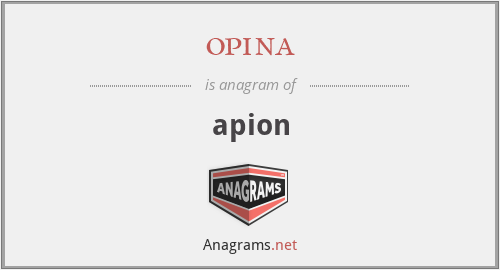opina apion
opina apion
opina
Translation
Find a translation for opina in other languages:
Select another language:
- - Select -
- 简体中文 (Chinese - Simplified)
- 繁體中文 (Chinese - Traditional)
- Español (Spanish)
- Esperanto (Esperanto)
- 日本語 (Japanese)
- Português (Portuguese)
- Deutsch (German)
- العربية (Arabic)
- Français (French)
- Русский (Russian)
- ಕನ್ನಡ (Kannada)
- 한국어 (Korean)
- עברית (Hebrew)
- Gaeilge (Irish)
- Українська (Ukrainian)
- اردو (Urdu)
- Magyar (Hungarian)
- मानक हिन्दी (Hindi)
- Indonesia (Indonesian)
- Italiano (Italian)
- தமிழ் (Tamil)
- Türkçe (Turkish)
- తెలుగు (Telugu)
- ภาษาไทย (Thai)
- Tiếng Việt (Vietnamese)
- Čeština (Czech)
- Polski (Polish)
- Bahasa Indonesia (Indonesian)
- Românește (Romanian)
- Nederlands (Dutch)
- Ελληνικά (Greek)
- Latinum (Latin)
- Svenska (Swedish)
- Dansk (Danish)
- Suomi (Finnish)
- فارسی (Persian)
- ייִדיש (Yiddish)
- հայերեն (Armenian)
- Norsk (Norwegian)
- English (English)
apion
- Apion
- Apion (Greek: Ἀπίων; 30-20 BC – c. AD 45-48) was a Hellenized Egyptian grammarian, sophist, and commentator on Homer. He was born at the Siwa Oasis and flourished in the first half of the 1st century AD. His name is sometimes incorrectly spelt Appion, and some sources, as in the Suda, call him a son of Pleistoneices, while others more correctly state that Pleistoneices was only a surname, and that he was the son of Poseidonius.
Citation
Use the citation below to add this anagram to your bibliography :
Style:MLAChicagoAPA
"opina." Anagrams.net. STANDS4 LLC, 2024. Web. 29 Apr. 2024. <https://www.anagrams.net/CGI-BIN/term/1275>.



apion with the community:
Report Comment
We're doing our best to make sure our content is useful, accurate and safe.
If by any chance you spot an inappropriate comment while navigating through our website please use this form to let us know, and we'll take care of it shortly.
Attachment
You need to be logged in to favorite.
Log In